Media
VAW Social media
Follow us on X (formerly Twitter), subscripe to our Newsletter or watch our latest videos on our youtube channel.
VAW News and Media
This are the latest VAW news and media contributions in national and international media.
“All glaciers in the Alps will disappear” – the irreversible transformation of Europe’s mountains
Dr Matthias Huss in Live for the Outdoors
Ghiacciai alpini, nei prossimi otto anni il picco dello scioglimento: oltre 100 persi entro il 2033
Dr Lander Van Tricht, Dr Matthias Huss in EconomiaCircolare.com
More ‘Glacier Funerals’
Dr Lander Van Tricht, Dr Matthias Huss in MillenniumPost
Dramatische Erkenntnis über die Alpen: Forscher sagen düsteres Szenario voraus
Dr Lander Van Tricht, Dr Matthias Huss in Yahoo Nachrichten
In den Alpen verschwinden die Gletscher schneller als gedacht – neue Studie nennt erstmals konkrete Jahre
Dr Lander Van Tricht in Frankfurter Rundschau
Jusqu'à 90% des glaciers pourraient disparaître d'ici 2100, selon une étude de l'EPFZ
Dr Lander Van Tricht, Dr Matthias Huss in RTS La 1ère
Weltweit könnten schon bald Tausende Gletscher pro Jahr schmelzen
Dr Lander Van Tricht, Dr Matthias Huss in Spiegel Online
Réchauffement climatique : l’« extinction » des glaciers atteindra un pic au milieu du siècle
Dr Lander Van Tricht in Le Figaro
The Alps to lose a record number of glaciers in the next decade

How much longer will glaciers survive? A new study from ETH Zurich researchers offers the first detailed projection of how many glaciers could vanish by 2100 due to global warming – and why regions such as Switzerland will be most affected. This approach could also help policymakers, the tourism industry and natural hazard management plan for the future.
World heading toward ‘peak glacier extinction’ with up to 4,000 set to disappear a year
Dr Lander Van Tricht, Dr Matthias Huss in CNN
Rate of glacier disappearance expected to peak by mid-2050s, scientists say
Dr Lander Van Tricht, Dr Matthias Huss in ABC News
Verlust der Gletscher: Schon in wenigen Jahrzehnten erreicht der Schwund seinen Höhepunkt
Dr Lander Van Tricht, Dr Matthias Huss in NZZ
Wereld moet zich opmaken voor verlies van tienduizenden gletsjers: ‘We staan erbij en we kijken ernaar’
Dr Lander Van Tricht in De Morgen
Réchauffement climatique : les glaciers touchés par « un pic d’extinction » d’ici à 2050
Dr Lander Van Tricht in Le Monde
Glaciers to reach peak rate of extinction in the Alps in eight years
Dr Lander Van Tricht in The Guardian
Warum ab 2040 jedes Jahr bis zu 4.000 Gletscher verschwinden könnten
Dr Lander Van Tricht in Tagesspiegel
Gletscherschwund: Mitte des Jahrhunderts erreicht das Sterben seinen Höhepunkt
Dr Lander Van Tricht in Süddeutsche Zeitung
Künftig verliert die Welt bis zu 4000 Gletscher – pro Jahr
Dr Lander Van Tricht in Tages Anzeiger
Bis 2100 Hälfte aller Gletscher verschwunden
Dr Lander Van Tricht in scienceORF.at
How many glaciers in Canada's Arctic can be saved from extinction?
Dr Lander Van Tricht, Dr Matthias Huss in Rocky Mountain Outlook
Unstable slopes and warming peaks: scientists race to understand Blatten collapse
Prof. Johan Gaume, Prof. Daniel Farinotti in Swissinfo
Pendant des siècles, des artistes ont documenté l’évolution puis la disparition de glaciers sublimes
Dr Matthias Huss in Le Temps
„Ein ziemlicher Schock“ – Antarktis-Forscher melden beunruhigende Beobachtung
Prof. Daniel Farinotti in Merkur.de
Gletscher in der Antarktis verlor Eismassen in Rekordgeschwindigkeit
Prof. Daniel Farinotti in Der Standard
Was unternimmt der Skisport, um seine Zukunft zu verlängern?
Dr Matthias Huss in NZZ
Wegen „Erinnerungsfunktion“: Experte zeichnet düsteres Alpen-Szenario
Dr Matthias Huss in Frankfurter Rundschau
The before and after images showing glaciers vanishing before our eyes
Dr Matthias Huss in BBC News
Bergsturz Blatten | Teil 1 | Zurück im Katastrophengebiet
Prof. Daniel Farinotti in SRF 1 Einstein
Gletscherjahr 2025: Wie die Eisriesen dahinschmelzen
Dr Matthias Huss in SRF News
And Swiss glaciers continue to melt

Glacial melting in Switzerland was once again enormous in 2025. A winter with low snow depth combined with heat waves in June and August led to a loss of three per cent of the glacier volume. This is the fourth largest level of shrinkage since measurements began. Consequently, the ice mass reduced by one quarter in the last ten years. This was reported by the Swiss Glacier Monitoring Network (GLAMOS), which is based at ETH Zurich and the Universities of Fribourg and Zurich.
D-BAUG Research Day 2025: From Micro to Macro

On 7 October 2025, the Association of Scientific Staff at D-BAUG invites all students, researchers and professors to the department’s annual “Meet & Share” event. This year’s theme will be “From Micro to Macro”, highlighting the variety of scales that researchers at our department work on – from the smallest processes to large-scale systems. Doctoral candidates and researchers from all institutes will present selected case studies. Join us for an afternoon of exchange, insight and inspiration!
The Glorious Glacier Ride, from Munich to Monaco

Cycling 1,600 km through the Alps – from Munich to Monaco – to give a voice to Alpine glaciers and raise awareness of climate change, Christophe Ogier shares his fresh impressions from a memorable day as part of the Glorious Glacier Ride.
Experts Are Worried After Bright Pink Water Flowed Down Swiss Alps During an Experiment
Michélle Dreifuss, Prof. Daniel Farinotti in Green Matters
Neun Millionen Kubikmeter Eis und Geröll stürzten über Blatten herein
Dr Mylène Jacquemart, Prof. Daniel Farinotti in Der Standard
Accelerated glacier melt is threatening Europe's villages, rivers and economies
Prof. Daniel Farinotti in KTEP 88.5 FM
Ursachen für Bergsturz bei Blatten weiter unklar
Dr Mylène Jacquemart in SRF News
The Effects of Melting Glaciers in Europe
Prof. Daniel Farinotti in NPR
Falling ice drives glacial retreat in Greenland

The Greenland ice sheet is melting at an increasing rate, a process accelerated by glacier calving, in which huge chunks of ice break free and crash into the sea, generating large waves that push warmer water to the surface. A new study now shows that this mechanism is amplifying glacial melt.
Deglaciation – surveying the ice

Glaciers are melting – and they have been melting for a long time. For over 150 years, scientists have tracked their retreat. In a captivating journey through time, the ETH Library and ETH Zurich’s glaciologists unveil the evolution of glaciology: from bold Alpine expeditions and early Ice Age theories to cutting-edge surveying technologies and urgent questions about our planet’s future.
The Lessons of a Glacier’s Collapse
Dr Mylène Jacquemart in New Yorker
Ein Bergsturz der Superlative
Dr Matthias Huss in Radio SRF 1
L’énergie hydraulique à l’échelle mondiale
Prof. Robert Boes in Bulletin
Die Katastrophe von Blatten – Wie gefährlich sind unsere Alpen?
Prof. Daniel Farinotti in SRF 1 Einstein
Welche Zukunft haben die Wasserkraftwerke in den Alpen?
Prof. Robert Boes in SRF News
Blatten nach der Katastrophe: Wie geht es weiter?
Prof. Daniel Farinotti in SRF News
Glacier collapse buried a village in the Swiss Alps
Dr Mylène Jacquemart in Earth.com
Updated: What ETH glacier researchers know about the collapse of the Birch Glacier

On Wednesday, May 28th, the Birch Glacier collapsed under the weight of rock and debris from rockfalls on the Kleine Nesthorn. Following an on-site inspection, ETH Zurich researchers explain the background to the collapse that buried the village Blatten in an updated fact sheet.
Angesichts der Katastrophe von Blatten fordert die Klimaallianz die Schweiz zum Handeln auf (Min. 11:09)
Prof. Daniel Farinotti in SRF 1, Tagesschau
Climate action could save half of world’s vanishing glaciers, says study
Dr Harry Zekollari in The Straits Times
Nearly 40% of the world’s glaciers are already doomed, scientists say
Dr Harry Zekollari in CNN
En Suisse, après l’effondrement d’un glacier sur Blatten, la montagne sous haute surveillance
Dr Matthias Huss in Le Monde
«Was wären die Schweizer Berge, wenn sie nur noch braune Schuttlandschaften wären?»
Dr Mylène Jacquemart in NZZ
Schweiz: Frühwarnsystem sagte Gletschersturz voraus
Prof. Daniel Farinotti in Deutsche Welle
Wissenschaftler: „Kein zwingender Zusammenhang mit Klimawandel“ – Lötschental einer weiteren Katastrophe entgangen
Dr Matthias Huss in Deutschlandfunk
The Swiss village wiped off the map by a glacier
Dr Matthias Huss in BBC News
Up to 76% of the global ice mass could disappear in the next few years, research shows
Dr Harry Zekollari in The Brussels Times
Klimawandel "verringert die Stabilität von Berghängen"
Dr Mylène Jacquemart in Tagesschau
»Der Berg ist gekommen«
Dr Mylène Jacquemart in Spiegel
Saving twice the ice by limiting global warming
Dr Harry Zekollari in PhysOrg.com
Save twice the ice by limiting global warming
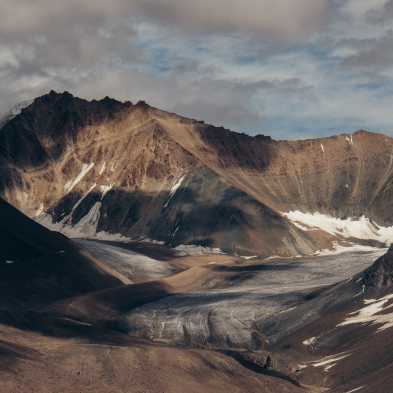
A new study with ETH Zurich, finds that if global warming exceeds the Paris Climate Agreement targets, the non-polar glacier mass will diminish significantly. However, if warming is limited to 1.5°C, at least 54 per cent could be preserved—more than twice as much ice as in a 2.7°C scenario.
Économiser deux fois la glace en limitant le réchauffement climatique
Dr Harry Zekollari, Prof. Daniel Farinotti in Issues.fr
Why glaciologists believe the Birch Glacier collapsed, burying a nearby Swiss town
Prof. Daniel Farinotti in ABC News
Arctic glaciers remain at risk even if int’l community reaches climate targets: study
Dr Harry Zekollari in RCI Radio Canada
Climate action could save half of world's vanishing glaciers, says study
Dr Harry Zekollari in The Mountaineer
Climate action could save half of world's vanishing glaciers, says study
Dr Harry Zekollari in RFI (via AFP)
Almost 40% of world’s glaciers already doomed due to climate crisis – study
Dr Harry Zekollari in The Guardian
Some Glaciers Will Vanish No Matter What, Study Finds
Dr Harry Zekollari in New York Times
Die Berge zerbröseln nun häufiger
Dr. Mylène Jacquemart, Dr. Matthias Huss in Frankfurter Allgemeine Zeitung
«Ob es nur ein Teilabbruch des Gletschers war, ist offen»
Dr Mylène Jacquemart in 20 Minuten
«Das war ein Vorzeichen» – Gletscherforscher ordnet den Bergsturz in Blatten ein
Dr Matthias Huss in watson
Was wohl zum Bergsturz geführt hat
Dr Matthias Huss in SRF News
Nach dem Bergsturz droht eine Flutkatastrophe
Dr Matthias Huss in Frankfurter Allgemeine Zeitung
«Der Felssturz ist absolut dramatisch, für die Schweiz ein einzigartiges Ereignis»
Dr Matthias Huss in Tages Anzeiger
Umstrittenes Kraftwerksprojekt: Neuer Stausee bedroht den zweitgrössten Gletscher der Schweiz
Prof. Daniel Farinotti in NZZ
The Antarctic water puzzle – how flooding contributes to ice melt
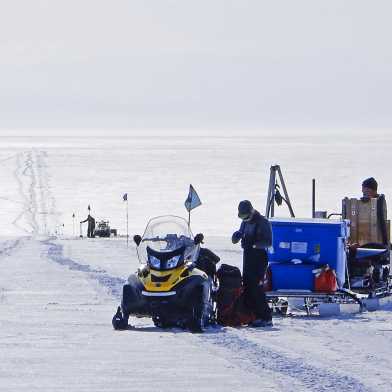
Hidden beneath the Antarctic ice lies a system of lakes and watercourses. A research team, including ETH researchers, has for the first time directly observed the subglacial streams of West Antarctica. Their study shows how individual flood events influence the melting of the ice.
Innovative sediment management in hydropower
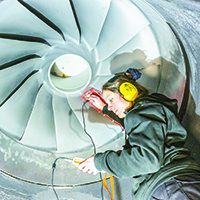
Storage hydropower plants in the Alps play a major role in the electricity supply. However, sedimentation reduces their storage capacity year after year, which can also lead to safety issues at dams. ETH researchers and power plant operators are examining the effects of diverting fine sediments via the turbines.
Die Folgen des Gletschersterbens
Dr. Matthias Huss in SRF Echo der Zeit
Peut-on encore sauver les grands glaciers de Suisse? Oui, espèrent des glaciologues, mais il faut agir maintenant
Dr Matthias Huss in Le Temps
Gletscher-Experte: «Die Schmelz-Auswirkungen sind aktuell ‹maskiert›»
Dr. Matthias Huss in watson
Das Wasserschloss Europas schmilzt
Dr. Matthias Huss in Tagesschau
Können Gletscher in höheren Lagen gerettet werden?
Dr. Matthias Huss in SRF News
“Switzerland’s glaciers could vanish completely by 2100”
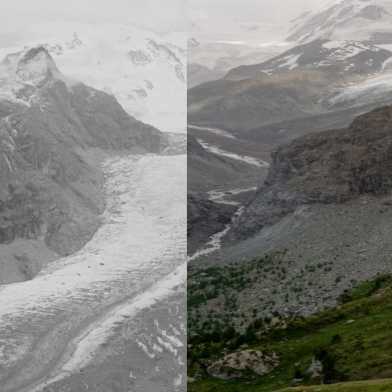
Switzerland’s glaciers are in increasingly poor shape. If greenhouse gas emissions are not cut drastically soon, they could cease to exist by 2100 – so says ETH Professor Daniel Farinotti in this ETH News interview to mark the first World Day for Glaciers.
Forscher nennt Gletscherschwund Überlebensfrage für die Menschheit
Prof. Daniel Farinotti in Spiegel Online
Gletscherschwund stellt unser Überleben in Frage
Prof. Daniel Farinotti in Global Magazin
ETH Zurich ranked 2nd worldwide in Civil & Structural Engineering

The Department of Civil, Environmental, and Geomatic Engineering at ETH Zurich is one of the best in the world: in the latest QS World University Rankings 2025, ETH is ranked second in Civil & Structural Engineering, marking a steady rise from 9th place in 2021.
Weltweiter Gletscherrückgang (Min. 17:45)
Dr. Matthias Huss in 3sat
«Im hinteren Teil des Sihlsees wurde ich fündig»
Prof. Daniel Farinotti in 20 Minuten
Global glacier melt: Major mass loss expected by 2100
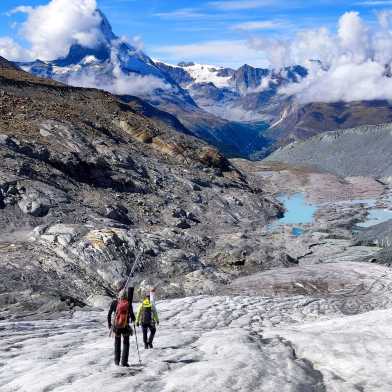
Glaciers around the world are shrinking at an alarming rate, threatening sea-level rise, water availability, biodiversity, and ecosystem stability. A new study led by researchers from ETH Zurich and Vrije Universiteit Brussel provides the most comprehensive projections to date, projecting the future of all 200,000 glaciers on Earth under the newest climate scenarios.
Früher Schneefall hat die Gletscherschmelze gestoppt
Dr. Andreas Bauder in Der Bund
Climate change leads to more alpine hazards
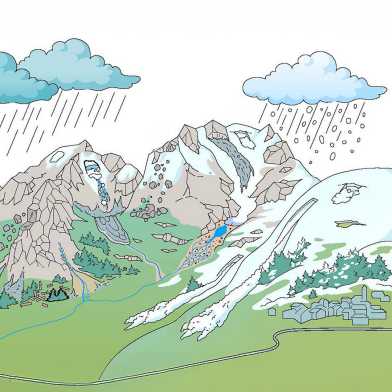
From rockfall to ice avalanches: Climate change is intensifying natural hazards in the mountains in many places, posing particular challenges for the Alpine region. This is the result of a study jointly coordinated by glaciologist Mylène Jacquemart and permafrost expert Samuel Weber from ETH Zurich and the Swiss Federal Institute for Forest, Snow and Landscape Research WSL. The international team has evaluated more than three hundred scientific papers from the past three decades.
The future of energy: a look at Energy Week @ ETH 2024
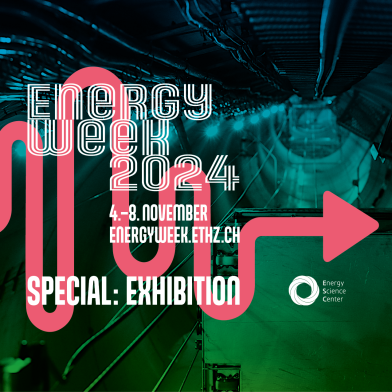
With a varied programme and a public exhibition in the ETH main hall, this year's Energy Week from 4 to 8 November will not only highlight the challenges of the energy transition, but also present possible solutions. Three D-BAUG researchers are contributing to this year's programme: Professors Robert Boes, Eleni Chatzi and Adrienne Grêt-Regamey.
Severe melting of glaciers despite heavy snowfall at high altitudes
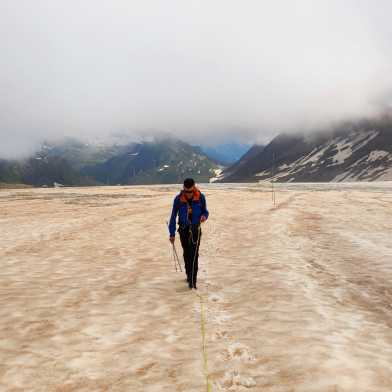
After the extreme circumstances encountered in 2022 and 2023, no relief is in sight for Swiss glaciers. Despite exceptionally large volumes of snow during the winter, a combination of temperatures in July and August that at times reached record levels and dust from the Sahara resulted in a loss of 2.5 percent of the glacier volume. This was reported by the Swiss Commission for Cryosphere Observation of the Swiss Academy of Sciences led by Dr. Matthias Huss.
Forscher dachten, viel Schnee schütze die Gletscher
Dr. Matthias Huss in Tages Anzeiger
Italy and Switzerland have agreed to shift their shared border in the Alps. Here’s why
Dr. Matthias Huss in CNN
«Bei so viel Regen wie in Österreich hätten wir auch ein Problem».
Prof. Robert Boes in Blick
«Schäden müssen in Kauf genommen werden, um Leben zu schützen»
Prof. Robert Boes in 20 Minuten
ETH-Professor: Neuer Staudamm hätte Hochwasserschäden in Zermatt verhindert
Mit einem intelligenten Einbezug der Talsperren lässt sich die Gefahr von Überschwemmungen im Bergkanton laut Experten senken.
Was wäre, wenn alle Gletscher abschmelzen?
Dr. Matthias Huss in ZDF
15 Jahre altes Urlaubsfoto zeigt Schwinden des Rhonegletschers
Dr. Matthias Huss in Spiegel Online


